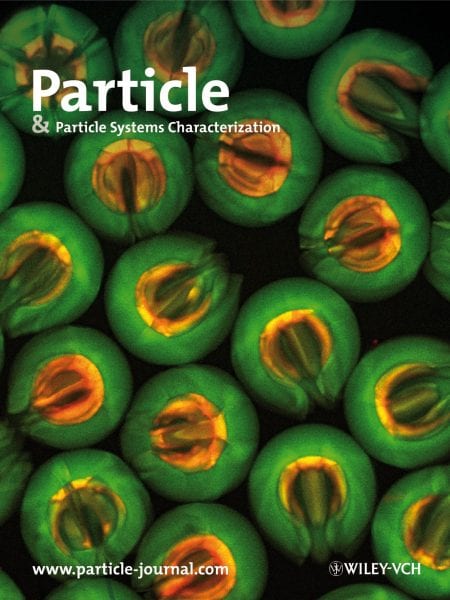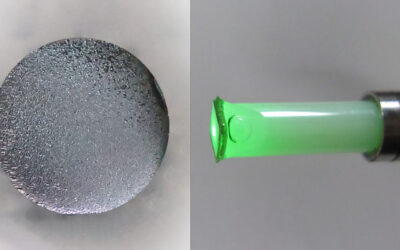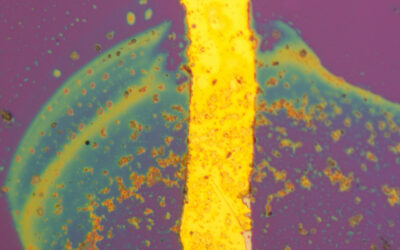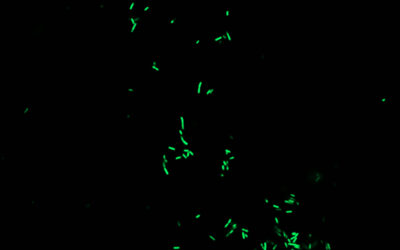Particle & Particle Systems Characterization, or “Particle” for short, is the newest member of the Advanced Materials and Small family of journals. It opened for submissions in June of this year, and will publish 12 issues in 2013.
 Research concerning particles, particle systems and their characterization spans many disciplines, from chemistry, physics and engineering to biosciences and materials science. Particle systems include those in biomedicine, catalysis, environmental science, micro/nanoelectromechanical applications, micro/nanofluidics, molecular electronics, photonics, sensing and others.
Research concerning particles, particle systems and their characterization spans many disciplines, from chemistry, physics and engineering to biosciences and materials science. Particle systems include those in biomedicine, catalysis, environmental science, micro/nanoelectromechanical applications, micro/nanofluidics, molecular electronics, photonics, sensing and others.
Luis Liz-Marzán, whose research focuses on colloidal synthesis, morphological and optical characterization, and the applications of nanoparticles and their assemblies commented that “Particle will be the perfect fit accompanying the Advanced Materials family and Small, and will surely become a reference journal on the synthesis, characterization and applications of particulate systems.” From 1st September this year, Professor Liz-Marzán will take up a new position as Scientific Director and Ikerbasque Research Professor at the Cooperative Centre for Research in Biomaterials (CiC biomaGUNE) in Spain.
“I feel that a large number of fields in the physical and biological sciences will be impacted by innovations in particle research.” explains Pulikel Ajayan, of Rice University in the USA, “The engineering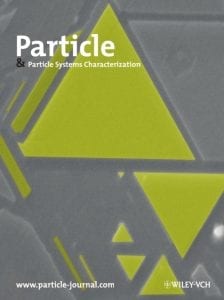 of particles with multifunctional properties will be a corner stone for the next generation of products in nanotechnology.” Professor Ajayan’s research interests include synthesis and structure-property relations of nanostructures and nanocomposites, materials science and applications of nanomaterials and phase stability in nanoscale systems.
of particles with multifunctional properties will be a corner stone for the next generation of products in nanotechnology.” Professor Ajayan’s research interests include synthesis and structure-property relations of nanostructures and nanocomposites, materials science and applications of nanomaterials and phase stability in nanoscale systems.
The in-house editorial office of Particle is supported by an Executive Editorial Board of six global leaders and an International Advisory Board, comprised of experts in all areas of particle, micro-, and nanotechnology.
Particles are constantly being implemented in new systems and according to Seung-Man Yang, who currently leads the Creative Research Initiative Center for Integrated Optofluidic Systems at the Korea Advanced Institute of Science and Technology (KAIST), “Particles have been the most abundant research resource in materials science and recent advances in  nanotechnology and life science have imposed tremendous demand on ‘smart’ innovative particles with tailored functionalities.” Professor Yang’s principal contributions have been in theories and experimental methods for fabricating ordered macrocrystalline structures, which can be applied as innovative functional nanoscopic materials such as optoelectronic devices and biosensors. Professor Yang feels that “The launching of Particle is very timely and will attract great interest from academia and industries. From Particle, readers in particle-related research can get cutting-edge information focused solely on particles in emerging technologies“.
nanotechnology and life science have imposed tremendous demand on ‘smart’ innovative particles with tailored functionalities.” Professor Yang’s principal contributions have been in theories and experimental methods for fabricating ordered macrocrystalline structures, which can be applied as innovative functional nanoscopic materials such as optoelectronic devices and biosensors. Professor Yang feels that “The launching of Particle is very timely and will attract great interest from academia and industries. From Particle, readers in particle-related research can get cutting-edge information focused solely on particles in emerging technologies“.
“Particles, with sizes in the range of micrometers or nanometers, have broad application in diverse fields.” says Shu-Hong Yu, a professor of chemistry at the University of Science and Technology of China (USTC). “Particle-based research has been an extremely active and interdisciplinary field, which attracts a huge research community globally.” Professor Yu’s research interests include the synthesis of nanostructures and self-assembly of new nanostructured materials and nanocomposites, and their related properties.
Particle will publish a range of article types – communications, full papers, reviews, and progress reports – and will be available on Wiley Online Library. Authors will have the opportunity to highlight their published work through cover pictures and frontispieces, as with Advanced Materials, Small, and the other journals in the family. “Editor’s Choice” articles, outstanding submissions chosen by the journal editorial staff, will be accessible for free.
Ali Javey, based at the University of California, Berkeley, USA says that “Particle is quite timely given the rapid growth of the field as fueled by recent advancements in the synthesis, characterization, and applications of particulate systems.” Professor Javey’s research interests encompass the fields of chemistry, materials science, and electrical engineering. His work focuses on the integration of nanoscale electronic materials for various technological applications, including novel nanoelectronics, flexible circuits and sensors, and energy generation and harvesting.
The official launch of Particle will take place at the MRS Fall meeting, which will be held in Boston, MA from 25th to 30th November this year. For further information on any aspect of Particle the editorial office may be contacted at [email protected].

